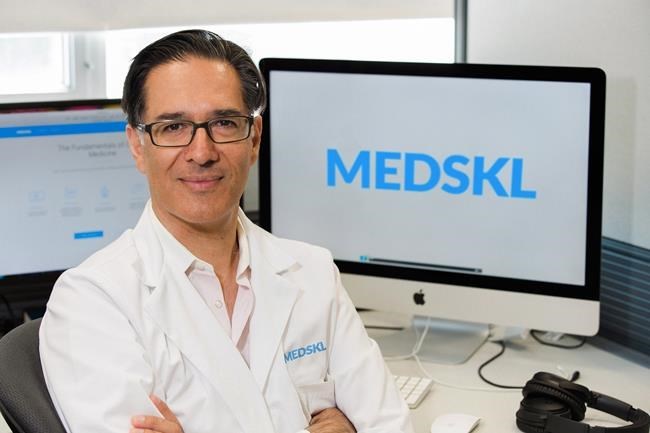
Dr. Sanjay Sharma of Queen’s University is shown in a handout photo. THE CANADIAN PRESS/HO-medskl.com MANDATORY CREDIT
September 21, 2016 - 2:03 PM
TORONTO - There's no question medical students have to cram in a lot of information on their way to becoming full-fledged doctors, and a new Canadian teaching website aims to make that journey a little less onerous.
Students now have access to a free online platform, called medskl.com, which provides digital-based learning for today's future physicians, many of whom have grown up on YouTube, says its developer.
"The lessons are designed to be short, fun and engaging so the information sticks," said Dr. Sanjay Sharma, a retina specialist and professor at Queen's University in Kingston, Ont., explaining that the open-access website employs video lectures, whiteboard animations and summary notes to help students diagnose and plan treatment for a broad range of illnesses.
"I started thinking about the traditional model of the one-hour didactic lecture and it clearly wasn't resonating with the millennial generation," Sharma added. "So that's where I said, 'Is there a way to really build a more effective and more accessible system for the next generation of physicians?'"
Medskl.com — using an oft-used short form for medical school — contains 100 teaching modules that cover everything from cardiology to geriatrics and neurology to rheumatology. Another 100 modules detailing additional topics are planned to be incorporated over the next three to six months.
Medical students from more than 50 universities have already registered, said Sharma, adding that a number of schools in Canada have said they will start using the website to complement class-based teaching.
Content on the online platform, currently available only in English, is consistent with the teaching objectives of the Medical Council of Canada, which in effect sets education standards for the country's 17 medical schools.
Each module contains a two-minute whiteboard animation, highlighting three or four critical facts about a certain condition; a 1,000-word written summary, geared around what should be checked in a patient on examination; and a 15-minute lecture "long enough to get across key messages, short enough so you don't lose learners," explained Sharma.
"It's all based on presentation, so what someone walks in the door with, the chief complaint they would have."
The modules aren't Canada-centric and can be used by students worldwide, he said.
"We obviously see pretty broad applicability right across the globe. And not necessarily only for physicians (in training), but for other health-care practitioners or caregivers or pre-med or even empowered patients."
Medskl.com tapped 170 professors, mostly from North American medical schools, to provide content, including some recommended by students who had attended their lectures.
One of them is Dr. Paul Olszynski, an emergency medicine physician teaching at the University of Saskatchewan. He was encouraged to apply as a contributor by some of his students, who had volunteered to help with the website's development.
"I was asked to help out with the topic of burns, which falls into my area of practice in that we typically will be the first point of contact for someone who suffers a burn," he said from Saskatoon.
"It's kind of neat because it's presenting it in a way that's going to be applicable to (students) as they move from undergraduate training to post-graduate training as residents," Olszynski said of the multimedia format.
Sharma, who developed medskl.com under the umbrella of his digital medical-content company, Cost Effective Healthcare Inc., has promoted use of the product through the Canadian Federation of Medical Students (CFMS).
Marie-Pier Bastrash, the organization's vice-president of student affairs, was given access to the website prior to its "soft launch' in July to see if it was a service CFMS members might be interested in pursuing.
"I think it's very well presented and laid out," said Bastrash, who's in fourth-year med school at McGill University in Montreal.
"As medical students, there's a lot of basic science knowledge and clinical knowledge that we need to integrate when we finally end up seeing patients in the hospital. And what's fantastic about medskl.com is it's broken down into what we call clinical presentations and by specialty.
"So it makes it easier for me, for example, who's on a gynecology rotation, to go look at all of the different case presentations of gynecological complaints that patients come into the hospital for. So based on that undifferentiated complaint, I can then go study direct material that pertains to that problem that my patient presented with."
Sharma said such online learning is not meant to replace traditional lecture-based and in-hospital education but augments it, and medskl.com's content fits in with a concept known as the "flipped classroom," in which students view videos and other digital materials before class, so that in-class time can be devoted to discussion.
"It becomes, 'OK, here are two or three cases that I want to talk about and I want to see how you guys can potentially manage them,'" he said as an example of what he might tell students learning about his specialty, ophthalmology.
"So the medical education in the flipped classroom strategy frontloads a lot of the content before the one-hour lecture. Then it becomes much more value-added and interactive."
———
On the web: http://www.medskl.com
Follow @SherylUbelacker on Twitter.
News from © The Canadian Press, 2016